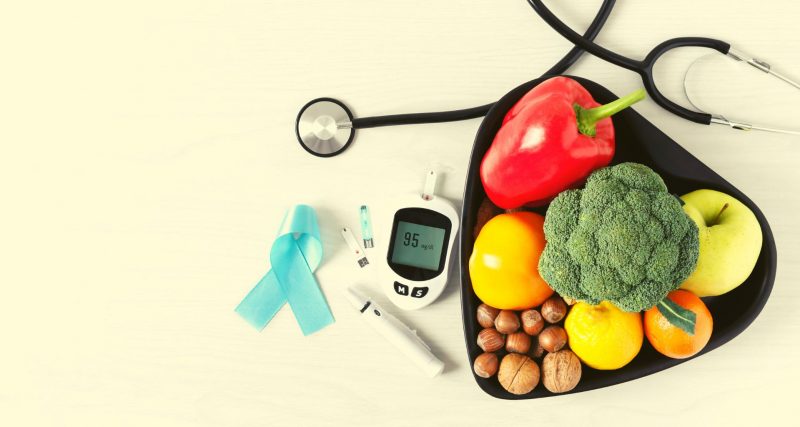Diabetes is a chronic condition that affects millions of people worldwide. High blood sugar levels characterize due to either insufficient insulin production or ineffective use by the body. While there is no cure for diabetes, it can be managed effectively with proper nutrition and lifestyle choices. In this comprehensive guide, we will explore the relationship between diabetes and food and provide you with practical tips to help you manage your diabetes.
Understanding Diabetes
To understand the relationship between diabetes and nutrition, it is important to first understand the two main types of diabetes:
Type 1 Diabetes: This type of diabetes is an autoimmune disease that usually develops in childhood or early adulthood. People with type 1 diabetes do not produce insulin, a hormone that regulates blood sugar levels. They therefore require insulin injections or an insulin pump to manage their blood sugar levels.
ADVERTISEMENT
Type 2 Diabetes: This type of diabetes is the most common and usually develops in adulthood, although it is increasingly being diagnosed in children and adolescents. People with type 2 diabetes produce insulin, but their body does not use it effectively, leading to high blood sugar levels. Type 2 diabetes is often associated with lifestyle factors such as being overweight or obese, physical inactivity, and poor dietary habits.
The Relationship Between Diabetes and Nutrition
Diet plays a crucial role in managing diabetes, regardless of whether you have type 1 or type 2 diabetes. Here are some ways in which nutrition can impact diabetes management:
Carbohydrates: Carbohydrates are the primary source of energy for the body and have the most significant impact on blood sugar levels. It is, therefore, important to manage carbohydrate intake carefully, especially for people with diabetes. Carbohydrates are found in a wide range of foods, including fruits, vegetables, grains, and dairy products. Eating foods that are high in fiber and low in sugar can help regulate blood sugar levels.
ADVERTISEMENT
Protein: Protein is essential for building and repairing tissues and is also a source of energy. People with diabetes should aim to consume protein in moderation, as excessive protein intake can cause the body to produce glucose, which can lead to elevated blood sugar levels.
Fat: Fat is an important source of energy and is necessary for absorbing certain vitamins and minerals. However, consuming too much fat can lead to weight gain, which is a risk factor for type 2 diabetes. It is, therefore, important to choose healthy sources of fat, such as nuts, seeds, and olive oil, and limit intake of saturated and trans fats.
Vitamins and Minerals: Vitamins and minerals are essential for overall health and can also play a role in diabetes management. For example, chromium, magnesium, and vitamin D are all important nutrients for regulating blood sugar levels. Eating a balanced diet that includes a variety of fruits, vegetables, whole grains, lean proteins, and healthy fats can help ensure that you get all the nutrients you need.
ADVERTISEMENT
Practical Tips for Managing Diabetes Through Nutrition
Here are some practical tips to help you manage your diabetes through nutrition:
- Choose complex carbohydrates: Foods that are high in fiber and complex carbohydrates, such as whole grains, fruits, and vegetables, are excellent choices for people with diabetes as they have a low glycemic index and help regulate blood sugar levels.
- Eat a variety of foods: Eating a variety of foods can help ensure that you get all the nutrients you need. Aim to eat a rainbow of fruits and vegetables, as each color provides different vitamins and minerals.
- Limit processed and sugary foods: Processed and sugary foods can cause blood sugar levels to spike and should be limited in the diet. Instead, opt for whole, unprocessed foods.
- Pay attention to portion sizes: Portion control is essential for managing diabetes. Use measuring cups and a food scale to ensure that you are consuming the correct portion sizes of different foods. It can be helpful to work with a registered dietitian to develop a personalized meal plan that meets your individual needs.
- Incorporate lean proteins: Lean proteins, such as skinless poultry, fish, and legumes, are excellent choices for people with diabetes as they provide important nutrients without raising blood sugar levels.
- Choose healthy fats: Healthy fats, such as those found in nuts, seeds, and olive oil, can help regulate blood sugar levels and reduce the risk of heart disease.
- Stay hydrated: Drinking enough water is important for everyone, but especially for people with diabetes, as dehydration can cause blood sugar levels to rise.
- Monitor your blood sugar levels: Regularly monitoring your blood sugar levels can help you identify patterns and make adjustments to your diet and medication as needed.
Conclusion
The relationship between diabetes and nutrition is complex, but by making healthy dietary choices, people with diabetes can effectively manage their condition and reduce their risk of complications. By focusing on complex carbohydrates, lean proteins, healthy fats, and a variety of fruits and vegetables, individuals with diabetes can help regulate their blood sugar levels and improve their overall health. If you have diabetes, it is important to work with a healthcare provider and a registered dietitian to develop a personalized nutrition plan that meets your individual needs.








